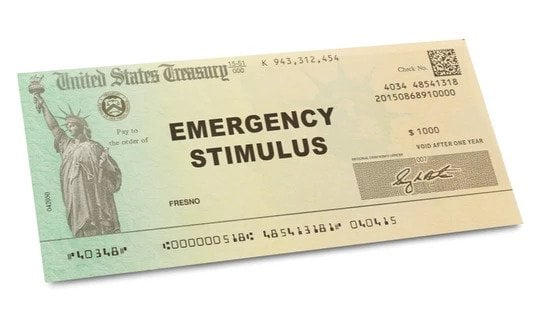
As the coronavirus pandemic began impacting millions of Americans, Congress responded by approving a $2.2 trillion stimulus package to help small and distressed businesses and struggling Americans through this challenging and unprecedented time. Approximately 140 million American households are expected to receive an economic impact payment from this bill.
However, as millions of taxpayers began receiving their stimulus check in April, an uptick of false information began to spread like wildfire across social media, worrying some taxpayers. To clear up any misunderstanding or false rumors, read on to learn more about five myths that you shouldn’t fall for when it comes to your stimulus check.
Myth #1: I Have to Pay Back the Stimulus Money I Get
The “pay back” myth has caused a lot of confusion among social media users. The truth is that you do not need to pay back your stimulus check. This payment is not a loan and is yours to spend as you please. Whether you decide to spend, save, invest, or donate it – the choice is entirely yours.
The confusion over whether stimulus checks must be paid back may have to do with a technicality related to this stimulus payment. While it’s not a loan, it is an advance on a tax credit Americans will receive when filing their 2020 tax return. In essence, it’s a sum of money that Americans would have received in the spring of 2021 as a credit on their 2020 taxes. Because so many taxpayers need this relief sooner than later – the IRS is paying it now.
Myth #2: My Stimulus Money Goes Toward My Taxes Owed to the IRS
Your stimulus check will not be held or reduced because of taxes that you owe to the IRS. This question is answered directly on the IRS website. The only exception is if you owe back payments in child support. If that’s the case, your stimulus check will be applied to the amount that’s past due.
While you do need to pay back any taxes you owe, it will not come automatically out of your stimulus payment. If you do owe taxes, it would be wise to save some or all of the funds provided by the stimulus check to go toward paying this back. The deadline to pay back your 2019 federal taxes is July 15, 2020.
Myth #3: My Regular Tax Refund Will Be Reduced by My Stimulus Payment
You will receive payment for your tax refund in addition to your stimulus payment. Your tax refund is the result of overpaying taxes in 2019. The stimulus check you receive is related to your 2020 taxes and is entirely separate from your 2019 tax refund.
According to statistics provided by the IRS, American taxpayers received an average refund of $2,795 for their 2019 taxes. The average American household’s average stimulus payment will be $1,523, meaning the average American taxpayer will receive $4,318.
Myth #4: My Stimulus Check is Taxable Income
Examples of taxable income include wages, money that you win from the lottery, and certain damages earned in a legal settlement. Tax credits, which is the technical term for the stimulus payment, is not taxable income. According to the IRS, this payment is not considered income that you must pay taxes on.
Taxpayers who file for bankruptcy also do not need to worry about their stimulus money being applied as income. For those who are already in a bankruptcy payment plan, the payment they receive will not be categorized as disposable income.
Myth #5: I Won’t Receive a Stimulus Check Because I Earned Too Much Money in 2018 & 2019
As previously noted, stimulus payments are considered a 2020 tax credit paid in advance. It’s true that taxpayers who make an income that’s above the threshold will not receive a stimulus check, but that may change when they file their 2020 taxes.
The stimulus payment is based on your income from 2019. If you haven’t yet filed your 2019 taxes, your income from 2018 is considered. If you made too much money, you would not receive a check at this time. However, the coronavirus has disrupted the operations of millions of businesses and, in turn, affected countless Americans’ income. If you did not receive a stimulus check this year and made below the threshold of income for 2020, you will receive your stimulus payment as a tax credit in 2021.
Call Experienced Tax Debt Attorney in Orange, CA for a Consultation
If you’re trying to handle tax debt on your own and are receiving threatening letters from the state or IRS concerning taxes that you owe, it’s critical that you get experienced legal counsel to guide you through this challenging time. Morgan Sebastian Law, PC, can help resolve your tax matters so you can move forward with your life without this onerous burden.
If you’d like to speak with a knowledgeable tax debt attorney today, schedule a consultation by completing our contact form or calling 877-938-1350.

